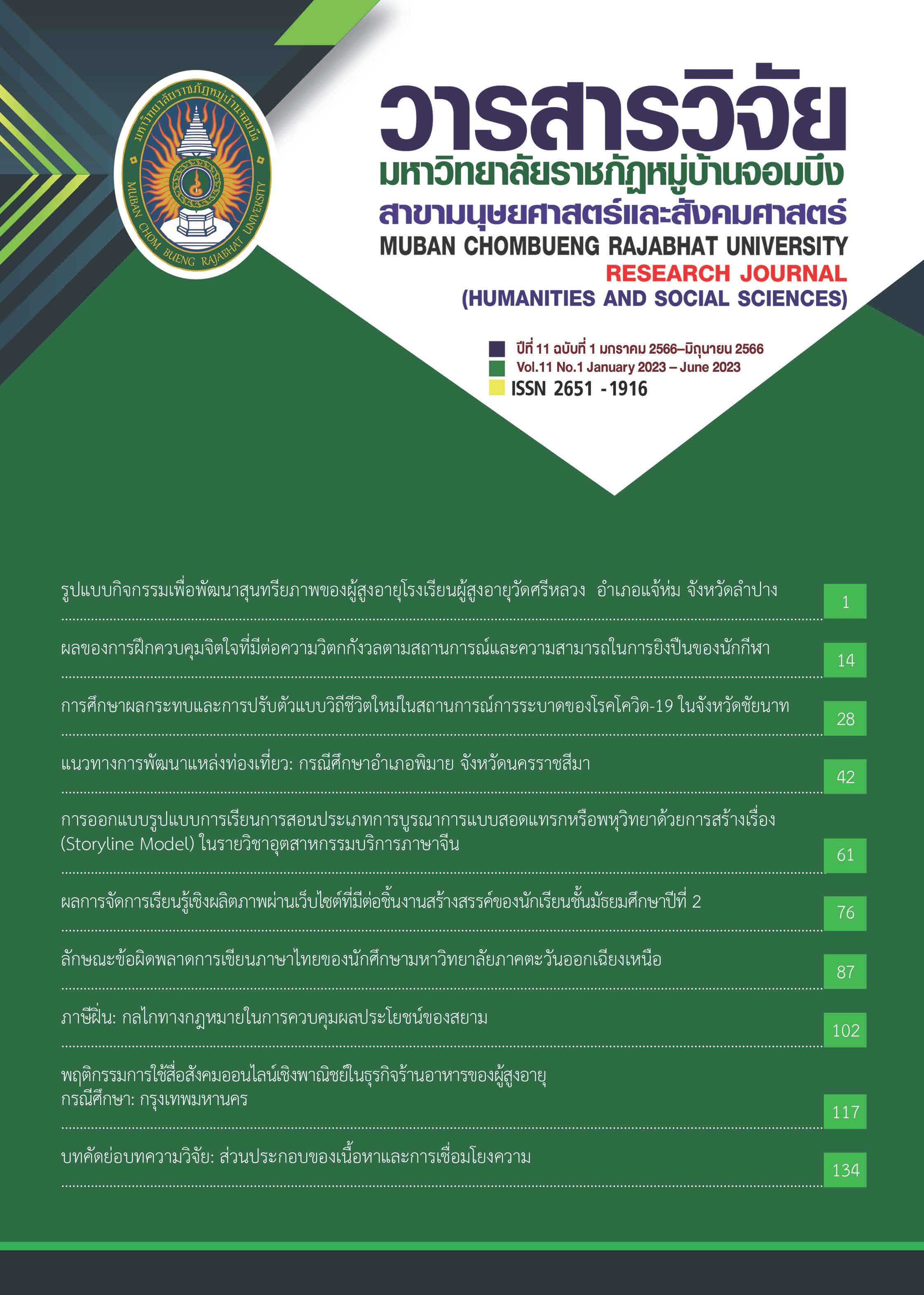Opium Tax: Legal Mechanism to Control Siam's Interests
Keywords:
Opium taxe, Opium, Legal mechanism, History, SiamAbstract
The objectives of this research were to 1. analyze the legal mechanism of opium taxation in order to control the interests of Siam, and 2. determine the significance of the legal mechanism in opium taxation to control the interests of Siam. The conceptual frameworks of this qualitative research consisted of theories of social organization, conflict, a broken window, and exchange between the king and the people. Documentary research was used as the research method, accompanied by document analysis and legally relevant theories. A descriptive narrative was written after the content was analyzed.
The results revealed that 1) the taxation of opium was a legal mechanism that established the relationship between the exercise of state power and the benefits derived from taxation, creating a culture in the sub-society in which both parties accepted the legal regulations with opium taxes as a synergy, thereby eradicating illegal opium; and 2) the significance of using legal mechanisms for taxation of opium was to strictly collect tax benefits into the royal treasury, establish regulations aligned with taxation goals, prevent Siam from losing tax benefits, and provide social protection against crime, which resulted in Siam losing income.
References
กฎหมายภาษีฝิ่นเพิ่มเติม. (109, 13 เมษายน). ราชกิจจานุเบกษา. เล่ม 7 แผ่นที่ 2, หน้า 13.
โกวิท วงศ์สุรวัฒน์. (2564). นโยบายและกลไกทางกฎหมาย ศึกษาตัวอย่างกรณีปัญหายาบ้า: สาเหตุ การแก้ไข และนโยบายใหม่. สืบค้นเมื่อ 7 ตุลาคม 2564, จาก http://164.115.27.97/digital/files/original/68fed21468cf654ad688f1416b5b3bc1.pdf.
โคเซอร์, ลิวอิส เอ. (2533). Master of Sociological Thought: Ideas in Historical and Social [แนวคิดทฤษฎีสังคมวิทยา ตอน คาร์ล มาร์กซ์]. (พิมพ์ครั้งที่ 1). กรุงเทพฯ : สำนักพิมพ์มหาวิทยาลัยธรรมศาสตร์.
นิตยา สุวรรณชฎ. (2527). สังคมวิทยา. กรุงเทพฯ: ไทยวัฒนาพานิช.
ถิราวดี ลีตรานนท์. (2554). มาตรการทางกฎหมายเพื่อจัดเก็บภาษีเงินได้บุคคลธรรมดาสัญชาติไทย ซึ่งมีเงินได้จากต่างประเทศ. วิทยานิพนธ์นิติศาสตรมหาบัณฑิต, มหาวิทยาลัยศรีปทุม วิทยาเขตชลบุรี.
ธุวพล ทองอินทราช, และโชติสา ขาวสนิท. (2562). วาทกรรมว่าด้วยโสเภณีในสังคมไทย. วารสารราชภัฏสุราษฎร์ธานี, 6(2), 67-90.
ประกาศข้อบังคับภาษีฝิ่น รัตนโกสินทร์ ศก 118. (117, 19 กุมภาพันธ์). ราชกิจจานุเบกษา. เล่ม 15 แผ่นที่ 47, หน้า 500-502.
ประกาศแก้ไขข้อบังคับภาษีฝิ่น ร.ศ. 118 ข้อ 2. (2457, 17 มกราคม). ราชกิจจานุเบกษา. เล่ม 31, หน้า 497.
ประกาศหอรัษฎากรพิพัฒน์. (108, 23 มีนาคม). ราชกิจจานุเบกษา. เล่ม 6 แผ่นที่ 51, หน้า 448.
ปริญญา เพ็ชรน้อย, กวินทิพย์ บัวแย้ม, และเชาวลิต สมพงษ์เจริญ. (2563). พัฒนาการของกฎหมายหมิ่นพระมหากษัตริย์จากอาชญาหลวงสู่ประมวลกฎหมายอาญา. วารสารอยุธยาศึกษา, 12(2), 52-65.
ปรามินทร์ เครือทอง. (2547). พระจอมเกล้า พระเจ้ากรุงสยาม = King Mongkut. (พิมพ์ครั้งที่ 7). กรุงเทพฯ : มติชน.
พนิดา ตาละคำ, อริสา ศุภากรเสถียรชัย, และเชาวลิต สมพงษ์เจริญ. (2564). สภาพบังคับทางอาญาในพระไอยการลักษณะผัวเมียสำหรับชายชู้. วารสารอยุธยาศึกษา, 13(2), 27-40.
พระราชบัญญัติภาษีฝิ่นเพิ่มเติม พระพุทธศักราช 2461. (2460, 26 มีนาคม). ราชกิจจานุเบกษา. เล่ม 34, หน้า 643.
เพ็ญแข ประจนปัจจนึก. (2528). พื้นฐานทางสังคมวิทยาของการศึกษา. กรุงเทพฯ: สถาบันวิจัยพฤติกรรมศาสตร์ มหาวิทยาลัยศรีนครินทรวิโรฒ.
มงคล เทียนประเทืองชัย. (2553). ทฤษฎีอรรถปริวรรตศาสตร์กับการตีความกฎหมาย. วารสารนิติศาสตร์ มหาวิทยาลัยนเรศวร, 3(1), 113–137.
วันวิสาข์ แก้วไทรฮุน, ธนพล สุขประสาท, และเชาวลิต สมพงษ์เจริญ. (2563). กฎหมายฝิ่น : เครื่องมือ ของรัฐในการควบคุมการบริโภคฝิ่นระหว่างพุทธศักราช 2433-2510. วารสารวิชาการมนุษยศาสตร์และสังคมศาสตร์ มหาวิทยาลัยราชภัฏพระนครศรีอยุธยา,8(2), 59-87.
สถาบันพระปกเกล้า. (2559). พระราชอำนาจในการตราพระราชกฤษฎีกา. สืบค้นเมื่อ 12 ตุลาคม 2564, จาก http://wiki.kpi.ac.th/index.php?title=พระราชอำนาจในการตราพระราชกฤษฎีกา.
สัญญา สัญญาวิวัฒน์. (2540). ทฤษฎีสังคมวิทยา : เนื้อหาและแนวการใช้ประโยชน์เบื้องต้น. (พิมพ์ ครั้งที่ 7). กรุงเทพฯ: จุฬาลงกรณ์มหาวิทยาลัย.
สุทธิพันธ์ ขุทรานนท์. (2525). การเก็บภาษีอากรและผลกระทบต่อสังคมไทย พ.ศ. 2416-2475. วิทยานิพนธ์ปริญญามหาบัณฑิต สาขาวิชาประวัติศาสตร์, จุฬาลงกรณ์มหาวิทยาลัย.
สุเทพ สุนทรเภสัช. (2540). ทฤษฎีสังคมวิทยาร่วมสมัย. เชียงใหม่ : บริษัท สำนักพิมพ์โกลบอลวิชั่น จำกัด.
สุภาภรณ์ จรัลพัฒน์. (2523). ภาษีฝิ่นกับนโยบายด้านการคลังของรัฐบาลไทย พ.ศ.2367-2468. วิทยานิพนธ์ปริญญามหาบัณฑิต สาขาวิชาประวัติศาสตร์, จุฬาลงกรณ์มหาวิทยาลัย.
อมร รักษาสัตย์. (2548). พระราชอำนาจตามกฎหมาย. ค้นเมื่อ 12 ตุลาคม 2564, จาก https://www.mcu.ac.th/article/detail/14337.
อัชพร จารุจินดา. (2546). การร่างกฎหมาย. สืบค้นเมื่อ 7 ตุลาคม 2564, จาก https:// www.krisdika.go.th/data/activity/act36.htm#_ftn1.
Wilson, J. Q. & Kelling, G. L. (1982). "Broken Windows: The police and neighborhood safety". Retrieved October 24, 2021, from https://www.theatlantic.com/ magazine/archive/1982/03/broken-windows/4465/.
Downloads
Published
How to Cite
Issue
Section
License
Copyright (c) 2023 Muban Chombueng Rajabhat University Research Journal (Humanities and Social Science)

This work is licensed under a Creative Commons Attribution-NonCommercial-NoDerivatives 4.0 International License.
Journal of TCI is Licensed under a Creative Commons Attribution-NonCommercial-NoDerivatives 4.0 International (CC BY-NC-ND 4.0) licence, unless otherwise stated, Please read our Policies page for more information on Open Access, copyright and permissions.



